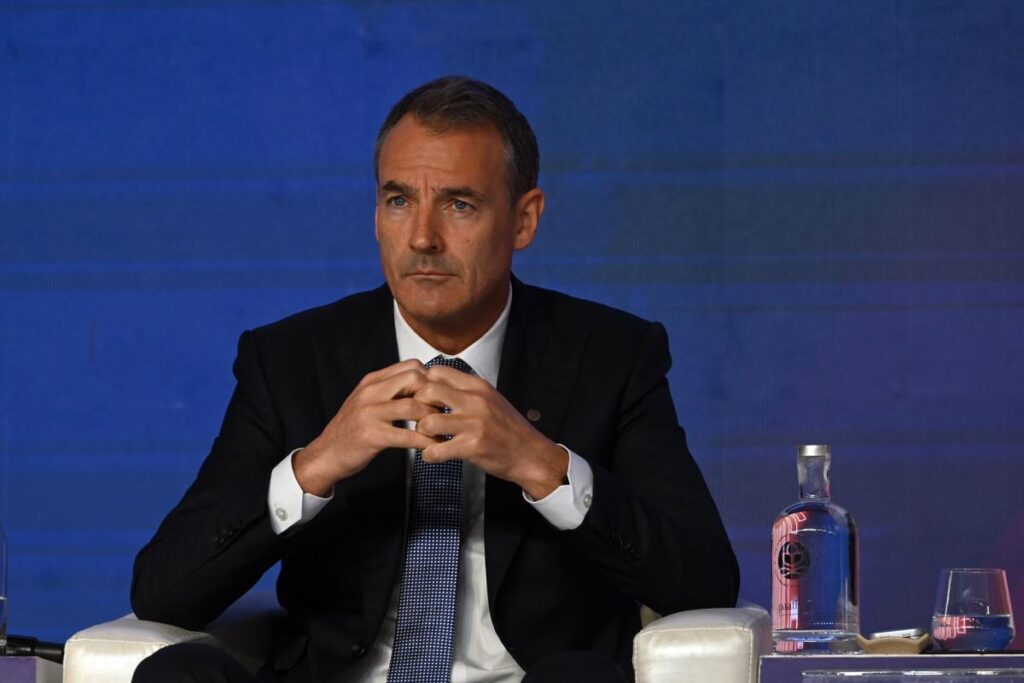(Bloomberg) — BP Plc Chief Executive Officer Bernard Looney has resigned effective immediately over the failure to fully disclose past relationships with colleagues.
Most Read from Bloomberg
The surprise development leaves the oil and gas giant leaderless at a crucial juncture, when it is trying to persuade investors to stick with it through a costly transition to low-carbon energy. It’s also another example of how the push for higher standards of personal behavior in the workplace, stemming from the Me Too movement, has reached the very top of the corporate world.
Looney, 53, will be replaced on a interim basis by Chief Financial Officer Murray Auchincloss, the company said in an emailed statement on Tuesday. BP didn’t name any potential successors, but has typically chosen CEOs from among the ranks of its own top executives.
BP said that its board reviewed allegations relating to Looney’s past personal relationships with colleagues in 2022, finding no breaches of the company’s code of conduct, according to the statement. Further allegations of a similar nature were received recently, after which Looney informed the company that he hadn’t been fully transparent with the previous investigation, the company said.
“He did not provide details of all relationships and accepts he was obligated to make more complete disclosure,” according to the statement. “The company has strong values and the board expects everyone at the company to behave in accordance with those values.”
BP American depositary receipts initially rose on the news, first reported by the Financial Times. They closed 1.3% lower in New York.
Since taking the top job over three years ago, Looney has been the strongest advocate among the CEOs of the oil supermajors for a faster shift into low-carbon energy. Even after pulling back on some of the most ambitious aspirations for emissions reductions earlier this year, BP still has one of the more aggressive plans to cut oil production and expand in electric-car charging and renewable energy.
The news comes a month after the London-based company raised its dividend by 10% and said it would buy back another $1.5 billion of shares. Despite these efforts to woo investors, BP shares have lagged its peers since Looney became CEO.
US giants Exxon Mobil Corp. and Chevron Corp., which have stuck far more closely to their core oil and gas businesses than the European majors, have been more appealing to investors, especially since Russia’s invasion of Ukraine sent energy prices soaring.
Bill Fitzpatrick, who helps manage $2.3 billion including BP shares at Newtown Square, Pennsylvania-based Logan Capital Management, said Looney had put BP on the right track.
“He managed the company in a very shareholder-friendly manner, had a deep commitment to clean energy, strong emphasis on capital allocation,” Fitzpatrick said in an interview. “There was a lot to like.”
However, Looney clearly exercised poor judgment by not being more forthcoming to the board, Fitzpatrick said.
“Are these guys never going to learn? They think they can get away with it,” he said. “It amazes me every time.”
Born in 1970 and trained as an electrical engineer at University College Dublin, Looney is a BP lifer, working his way up through the chain of command from drilling engineer to chief of exploration before his elevation to CEO in 2020.
His departure brings an end to the dominance within BP of a group of executives known as the “turtles.” These were assistants of former CEO John Browne, who wrote in his memoir of how they were named after the Teenage Mutant Ninja Turtles because of “their speed and ability to appear whenever they were needed.” Looney’s two predecessors in the top job, Tony Hayward and Bob Dudley, were both drawn from this group.
Looney’s abrupt exit hurts BP from a strategic standpoint, said Eric Talley, a Columbia Law School professor who studies the intersection of corporate law, governance and finance. In the end, he gave the board little choice.
“The one thing you need to be able to do is disclose truthfully when asked about potentially problematic situations,” Talley said in an interview. “Otherwise, it makes it untenable to go forward. The board has got to be able to trust the CEO.”
–With assistance from Anne Riley Moffat and Joe Carroll.
(Updates with comments from investor in 10th paragraph, corporate governance expert in final paragraph.)
Most Read from Bloomberg Businessweek
©2023 Bloomberg L.P.


